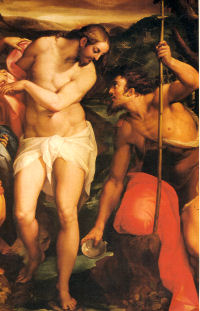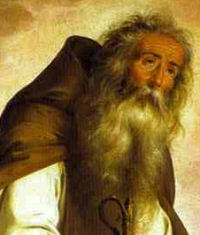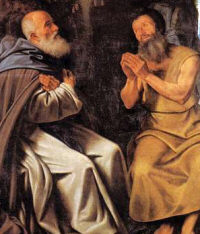Finnish Catholics and Lutherans visit Vatican - Independent Catholic News
| Finnish Catholics and Lutherans visit Vatican | ||
| Posted: Thursday, January 22, 2015 5:44 pm | ||
| ||
|
| Finnish Catholics and Lutherans visit Vatican | ||
| Posted: Thursday, January 22, 2015 5:44 pm | ||
| ||
|
| St. Agnes |

|
Cyprian Tansi had three names. Iwene was the name given by his father at his birth in 1903, Michael was his baptismal name, andCyprian his monastic name. Born into a pagan family, he was sent to a Catholic school where at the age of eight he was baptised.
On completing his education he became a teacher, and in 1925 entered the seminary. As a catechist, Michael saw to it that no child died without Baptism when he was there. Pagan and Christian alike came to him to settle their disputes. In 1937 he was ordained priest. He was an admirable pastor. There were no bounds to his zeal, his self-giving, his generosity and his good humour.
Sister Magdalen, an Irish Holy Rosary Sister, gave him a copy of Dom Marmion's Christ the Ideal of the Monk. This book sowed the seeds of a monastic vocation, which lead him to join Mount Saint Bernard Abbey in
He died unexpectedly 20 January 1964 aged 60, and was buried at
However, his old parishioners in his native Iboland pressed his cause. In September 1986 his remains were exhumed and brought back to Pope John Paul II travelled to
Cyprian was a man of tiny stature and so he appears in this Window, with his impish smile, dressed in his Cistercian cowl, with his beloved Iboland huts and hills in the background. A companion said of him that as a young teacher "he would talk with Our Lady as a child talks to his mother" As pastor he was deeply committed to promoting the Legion of Mary and the Children of Mary, and strongly recommended the Rosary At Mount Saint Bernard it was noted that: "his love of the Lady Chapel speaks for itself."
In the bottom panel there are symbols of the three basic elements of monastic life: Opus Dei (liturgical life), Opus Manuum (manual labour), and Lectio Divina (God-centred reading). The African drum and vessels symbolise the Liturgy; for work, Cyprian at the book-sewing press; and for Lectio, the book, Christ the Ideal of the Monk.
Fr. Laurence Walsh ocso Lumen Christi
The Stained Glass Windows Mount Roscrea 2009
(Online Shop at www.msjroscrea.ie)
|
BLESSED CYPRIAN MICHAEL IWENE
TANSI (1903-1964)
|
|
At the age of 22, after several
years of working as catechist and school teacher, he entered the seminary and
was ordained a priest for the Onitsha diocese in 1937, when he was 34. As
parish priest he worked zealously in Eastern Nigeria for 13 years, selflessly
serving the religious and material needs of his people.
|
 |
| Statue of Baldwin of Forde from the exterior of Canterbury Cathedral |

 We mortals know that God can speak directly to our hearts, and actually has done so to many men in the past. We know that he can do directly all that is done by his Church, to whom he gave the power, with its teaching magisterium and sacraments. If he were to act in this way we should be open to continuous doubts about the source of our inspirations and the objectivity of the graces we thought we were receiving. It was to remove such doubts, and the possibility of self-deception that Christ left to us the external visible kingdom to which he gave all the powers necessary for men's salvation. It was for the security and peace of men's consciences that he set up a visible Church founded on the Apostles, men like ourselves, but transformed by his assisting grace.
We mortals know that God can speak directly to our hearts, and actually has done so to many men in the past. We know that he can do directly all that is done by his Church, to whom he gave the power, with its teaching magisterium and sacraments. If he were to act in this way we should be open to continuous doubts about the source of our inspirations and the objectivity of the graces we thought we were receiving. It was to remove such doubts, and the possibility of self-deception that Christ left to us the external visible kingdom to which he gave all the powers necessary for men's salvation. It was for the security and peace of men's consciences that he set up a visible Church founded on the Apostles, men like ourselves, but transformed by his assisting grace.
 |
| Painting of Saint Anthony, a part of The Visitation with Saint Nicholas and Saint Anthony Abbot by Piero di Cosimo, ca. 1480. |

 St. Anthony lived in solitude for about twenty years. "His was a perfectly purified soul. No pain could annoy him, no pleasure bind him. In him was neither laughter nor sadness. The sight of the crowd did not trouble him, and the warm greetings of so many men did not move him. In a word, he was thoroughly immune to the vanities of the world, like a man unswervingly governed by reason, established in inner peace and harmony."
St. Anthony lived in solitude for about twenty years. "His was a perfectly purified soul. No pain could annoy him, no pleasure bind him. In him was neither laughter nor sadness. The sight of the crowd did not trouble him, and the warm greetings of so many men did not move him. In a word, he was thoroughly immune to the vanities of the world, like a man unswervingly governed by reason, established in inner peace and harmony."